BATTLEGROUND ANTARCTICA
‘It’s a moral disgrace’: Cape Town mayor spits fire as Russian seismic ship sails to Antarctica
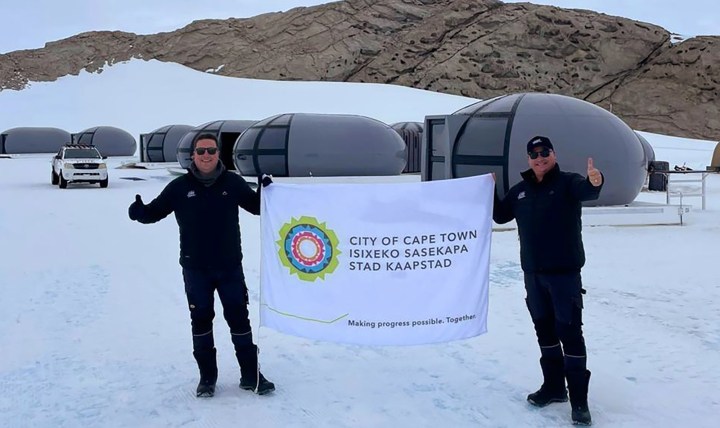
A non-profit coalition of about 30 organisations has called on South African authorities to refuse re-entry to the Kremlin’s Antarctic mineral ‘explorer’ — a regular visitor in Table Bay. Meanwhile, Cape Town Mayor Geordin Hill-Lewis, who was in Antarctica on Monday, has told Our Burning Planet that Russian state vessels should not berth anywhere near Table Mountain.
The Akademik Alexander Karpinsky — a Russian seismic ship equipped with powerful airguns that could harm marine life — has left Cape Town, ostensibly to look for fossil fuels in the seabed below the climate-stressed Southern Ocean.
Now, a fired-up non-profit coalition representing 29 groups has sent a letter of demand to national and Western Cape authorities. They say they will not let the ship, due back in Table Bay within weeks, off the hook for its loud seismic blasts and ocean-based surveys that resemble the early stages of prospecting.
The 1959 Antarctic Treaty — to which Russia and South Africa are two of 12 founding signatories — allows scientific research. But it forbids traditional mineral resource activities, such as prospecting, which the Karpinsky seems to have conducted via Cape Town almost every year since a 1998 mining ban in the Antarctic came into force.
Numerous peaceful protests by Extinction Rebellion (XR), Greenpeace volunteers and other non-profit groups were held in Cape Town on 28 January to “unwelcome” the Kremlin-owned ship.
Owned by the Polar Marine Geosurvey Expedition (PMGE), a subsidiary of the Kremlin’s state mineral explorer, Rosgeo, the ship had sailed from St Petersburg to Cape Town as part of an annual voyage that takes her to the stark, treacherous Southern Ocean.
The Karpinsky was in the port city’s larger container dock for several days, as protesters at the popular Waterfront and harbour areas chanted, “Hands off Antarctica!”
At about 9.30am on 1 February, the Karpinsky slipped out of town, heading, oddly, towards Tallinn, the Estonian capital. Minutes later, her navigation system seemed to correct itself.
Next stop, Antarctica — Earth’s last unmined frontier. Here, another season of murky seismic investigations may now help Rosgeo — Russia’s largest geological minerals, oil and gas explorer — build long-term inventories of the Far South’s potential resource wealth.
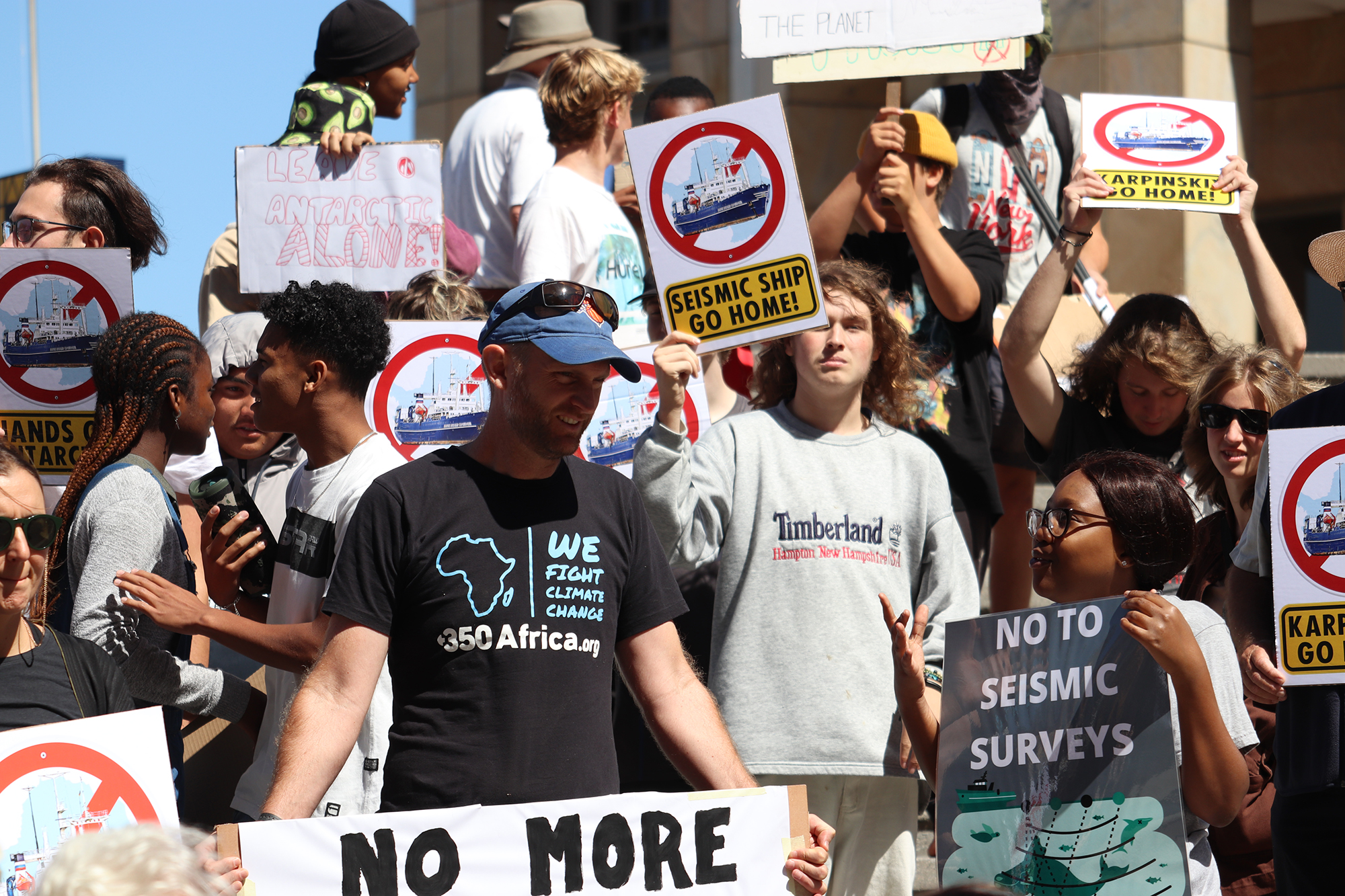
Cape Town protesters in January, rallying against the Akademik Alexander Karpinsky, a Russian Antarctic seismic vessel. (Photo: Jamie Venter)
At the Earth’s opposite northern ends, in the Russian Arctic, Rosgeo’s PMGE subsidiary has legally explored for minerals. The subsidiary also has a licence under the UN-affiliated International Seabed Authority to prospect and explore a central Atlantic block for polymetallic sulphides. Thus, its decades-long Antarctic interests through Cape Town should not be surprising — yet these were only first exposed by a series of Our Burning Planet articles between 2021 and 2023.
As reported, the subsidiary’s multiple Russian-published reports have repeatedly declared that these Antarctic missions are aimed at investigating the Southern Ocean’s “mineral potential”.
In its December-published annual scientific report, the subsidiary goes on to note its seasonal goals are “decreed” by the Kremlin and include “the creation of an information base for the assessment and scientific forecast of the mineral raw-material potential of the Antarctic”.
It is exactly this type of activity that an abandoned 1988 Antarctic mining pact defines as “prospecting”. Setting some legal precedent by featuring signatures of 20 Antarctic Treaty states — including Russia and South Africa — the pact understands prospecting as an activity “aimed at identifying areas of mineral resource potential for possible exploration and development”.
In February 2020, Rosgeo issued a statement near the foothills of Table Mountain, laced with the language of commerce uncannily like the mining pact’s prospecting definition. Though it did not offer recoverability estimates, the announcement said the Karpinsky had hunted down a staggering 500 billion barrels of oil and gas in the Antarctic seabed.
Visit Daily Maverick’s home page for more news, analysis and investigations
‘A potential reserve for extraction’
The protesting groups told Our Burning Planet it was hardly Rosgeo’s Cape Town-issued statement alone that sparked the protests.
The subsidiary has previously declared in Russian-language documents that the “nature” of these seismic surveys — which have searched more than 100,000km of sensitive Southern Ocean seabed for hydrocarbons — is geopolitical rather than scientific, and might ultimately lead to future extraction.
“The works of the PMGE aimed at studying the geological structure and mineral resources of the Antarctic are of a geopolitical nature. They ensure guarantees of Russia’s full participation in any form of possible future development of the Antarctic mineral resources — from designing the mechanisms for regulating such activities up to their direct implementation,” the subsidiary reveals in its 55th anniversary report, published in 2017.
And in this 2015 report, the subsidiary reveals that “the purpose of the geological and geophysical work” of that year “was to ensure the geopolitical interests of Russia in the Antarctic in the form of systematic regional geological and geophysical studies of the subsoil of Antarctica and the adjacent continental shelf, which represent a potential reserve for the extraction of mineral raw materials by future generations of humankind”.
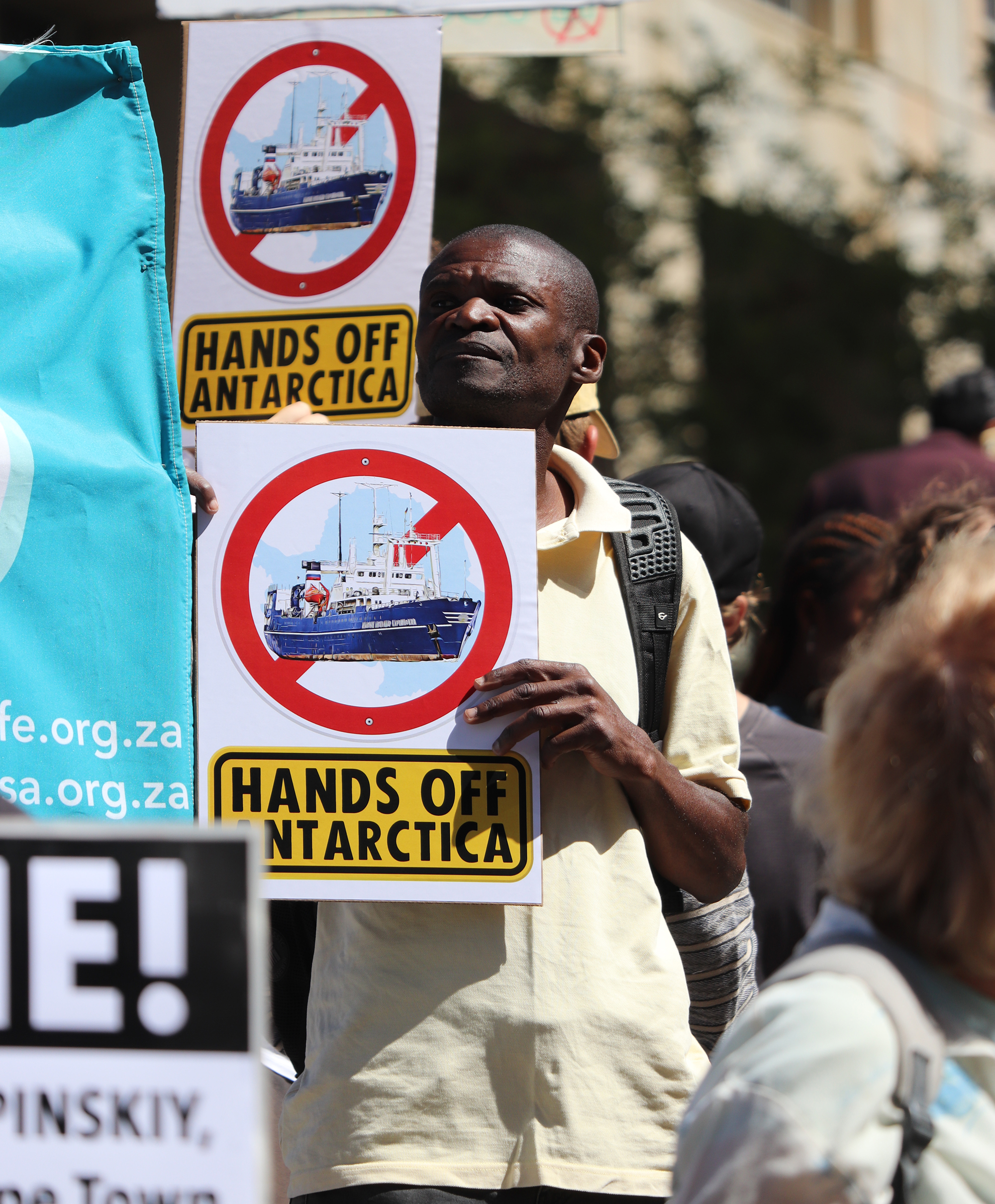
Themba George, a Khayelitsha-based volunteer with 350.org, at the January protests against the Karpinsky. (Photo: Jamie Venter)
Our Burning Planet has uncovered absolutely no evidence or even a suggestion that Russia has, at any point, engaged in mineral resource activities such as Antarctic exploratory drilling, dredging and other excavations, or has any immediate plans to do so. But numerous documents approved by the Kremlin — rather than simply the Rosgeo statement — point to the early stages of prospecting, by claiming there are supergiant oil fields beneath the Southern Ocean totalling “70 billion tons” (thus, 500 billion barrels).
And it is none other than Russia’s 2022-approved “Reproduction and Use of Natural Resources” programme, which has a budget of 156-billion roubles ($2-billion) for the next three years, that hardwires Antarctica into the Kremlin’s very latest mining policy.
Heavily reliant on scientific research, this programme’s strategy for developing Russian minerals lists, as its first priority, “the study of the geological structure of the Arctic, Antarctic and the seabed and global ocean”.
The programme also cites “Geology: Revival of a Legend” — a federal project aimed at the “aggressive development” of Russia’s economy and boosting its mineral wealth. And, indeed, the PMGE says its 2022 assessments of Antarctica’s mineral potential were carried out under the framework of the “Legend” federal project.
These state documents were reviewed by us in their original Russian form, as well as other reports that indicate the apparent raison d’être of Russia’s Antarctic seismic surveys.
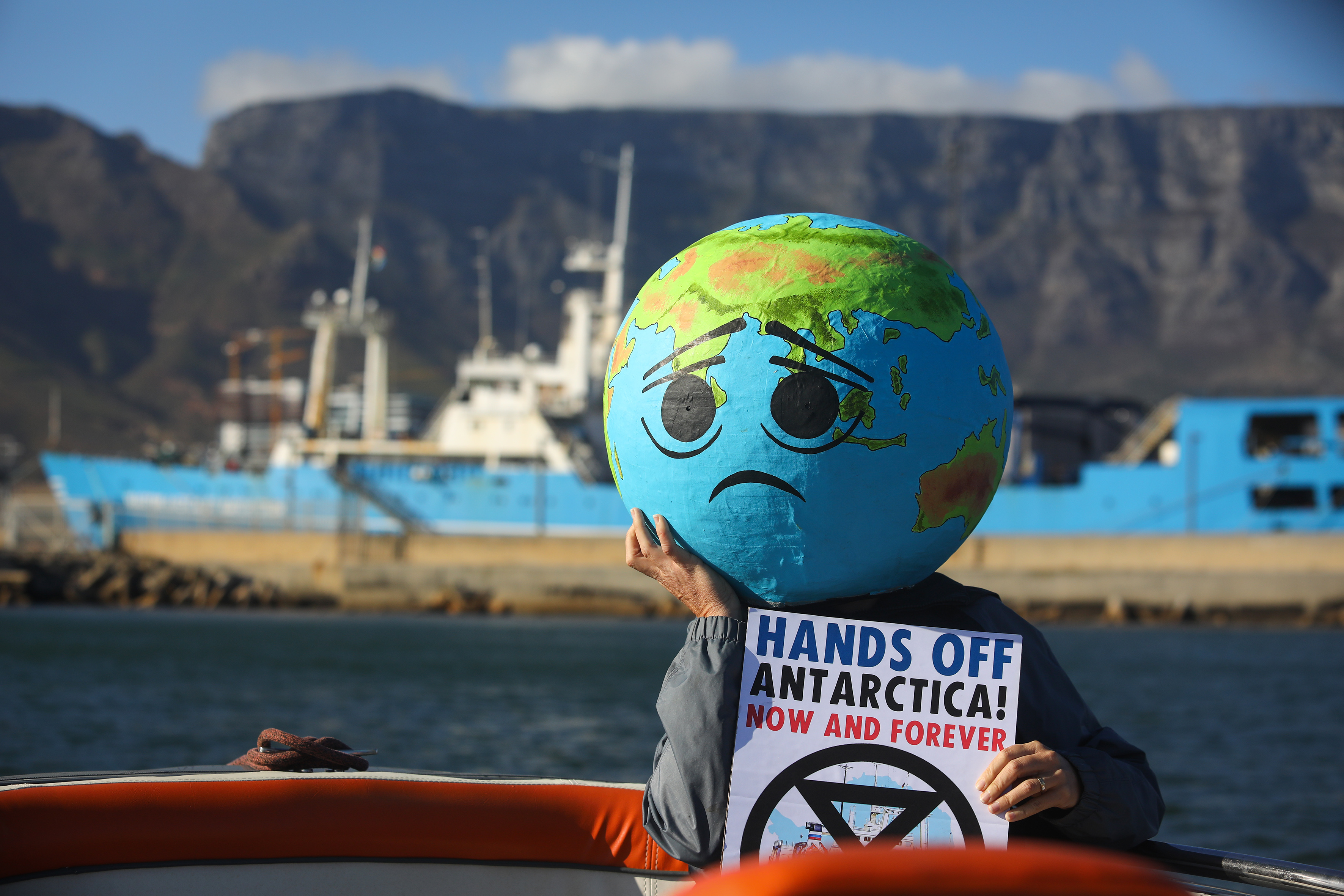
An Extinction Rebellion protester framed by Table Mountain, with the Karpinsky docked in port. (Photo: Shelley Christians)
The mining ban does not expire, but it can be renegotiated after 2048 should one of just 29 decision-making states under the Antarctic Treaty System (ATS) — the greater 55-state framework that governs the region — call for it.
This may suit some, suggests Prof German Leitchenkov, Antarctic geoscience head at Russia’s Research Institute of Geology and Mineral Resources of the World Ocean, a state body that partners with the PMGE on research.
Leitchenkov — while having led papers on Antarctica’s mineral potential that suggest the mining ban is a “gentleman’s agreement” — told us he also worried about Antarctic environments and that other countries could be prospecting.
When asked if sanctions-hit Russian oil and gas changed Antarctic exposure to the possibilities of mining, the professor said: “I will not foresee any changed circumstances for the potential of Antarctic mining in the longer-term future.”
Echoing Leitchenkov’s sentiments, two Russian-speaking men arrived during the protests at Cape Town’s V&A Waterfront. They claimed to work on the Karpinsky. In response to protester complaints about Antarctic “exploration” and “blasting” — a protester told us — the men reportedly said, “Everyone’s doing it.”
Our Burning Planet was unable to verify their identities, and they declined our requests for comment.
Snow-booted Cape Town mayor weighs in
“We strongly object to the harmful oil and gas exploration that the ship has been carrying out in the Antarctic region, which is a globally important marine sanctuary — and the fact that the port of Cape Town has served as its launch pad for more than two decades,” reads the group’s letter of demand, sent to President Cyril Ramaphosa’s office, several government departments, the ports authorities and Cape Town Mayor Geordin Hill-Lewis.
The letter says it wants authorities to refuse port entry to all ships, including the Karpinsky, looking for Antarctic oil and gas, and to table a formal proposal for a permanent ban on hydrocarbon mining at the ATS’s upcoming midyear annual meeting in Helsinki.
It is also concerned about the peer-reviewed impacts of seismic blasts on Southern Ocean marine life.
“There is no other plausible reason for Russia to have built up this detailed hydrocarbon inventory, other than that it hopes to start extracting some of these oil or gas resources at some point in the medium- or long-term future,” the letter adds.
“If that happens, Antarctica — and the whole world — will suffer even more devastating impacts.”
View this post on Instagram
Cape Town mayor Geordin Hill-Lewis in East Antarctica on Monday, promoting Cape Town as the world’s premier Antarctic gateway city.
For his part, in a direct response to the demand letter, Hill-Lewis is outspoken about Russian foreign minister Sergey Lavrov’s recent official visit to Pretoria; upcoming military exercises off the KwaZulu-Natal coast with Russia and China; and Russian state vessels calling at his gateway port city for any number of possible reasons.
These are all issues the Democratic Alliance – South Africa’s official opposition, of which Hill-Lewis is a member — has been critical about in public statements.
“Russian state vessels should not be here,” says Hill-Lewis, who happened to jet into Antarctica on Monday to relaunch Cape Town as a gateway destination.
“All of these Russian war exercises, and the meetings with Russian government ministers, are a shameful moral disgrace.”
Even so, Hill-Lewis points out that his hands are tied.
“Unfortunately, the ports are managed by national government and therefore the City has no control over the vessels which dock there.”
While at Wolf’s Fang Runway in East Antarctica’s Queen Maud Land — the same vast region where South Africa has a research station — Hill-Lewis said: “‘It was a privilege to witness the Antarctic’s pristine wilderness first-hand via a short flight from Cape Town…
“We want more people to choose our city as their preferred gateway to reach international scientific bases, or to experience the continent’s unique sustainable tourism offering.
“We are launching a new destination marketing campaign with a clear message — Cape Town is the best place to come before you head way down south. Where else can you go from sun and beautiful beaches to Antarctica in just five hours?”
Taking the Wild Coast fight to Antarctica
The letter of demand, apart from Extinction Rebellion and Greenpeace volunteers who have spearheaded the campaign, includes signatures by diverse concerned groups such as the South African Fishers Collective, the South Peninsula Khoi Council and WildAid Africa.
“What happens in the Antarctic will impact the same ocean animals that visit the ocean off our South African coast,” says Margie Pretorius, director of Sustaining the Wild Coast (SWC), which also signed the letter.
The SWC was one of the applicants that took Shell to court over its now suspended seismic surveys off the Wild Coast, home to the annual sardine run and rich in marine life.
“If we oppose seismic blasting on the Wild Coast,” says Pretorius, “we must oppose it in the Antarctic.”
The Green Connection is another group that has successfully challenged Shell and other offshore explorers in South African courts. It, too, has now set its sights on Antarctica. In 2017, the group’s Liziwe McDaid co-led a Herculean coalition that stopped South Africa’s $76-billion nuclear power deal with Russia.
“Underwater noise may cause marine species not being able to communicate with each other,” says Nandipha Masango, the group’s media coordinator. “Or they might simply migrate to other areas — shifting the food chain within the marine ecosystem.”
XR Cape Town spokesperson Cassi Goodman says, “There is much more awareness about the harm caused by seismic blasting these days… Just because something has been done for a long time, like seismic blasting in the Antarctic, does not mean we can allow it to continue.
“We used to build things with asbestos, but once the adverse health effects from exposure to asbestos became known, it had to stop, no matter how difficult and inconvenient it may have been.”
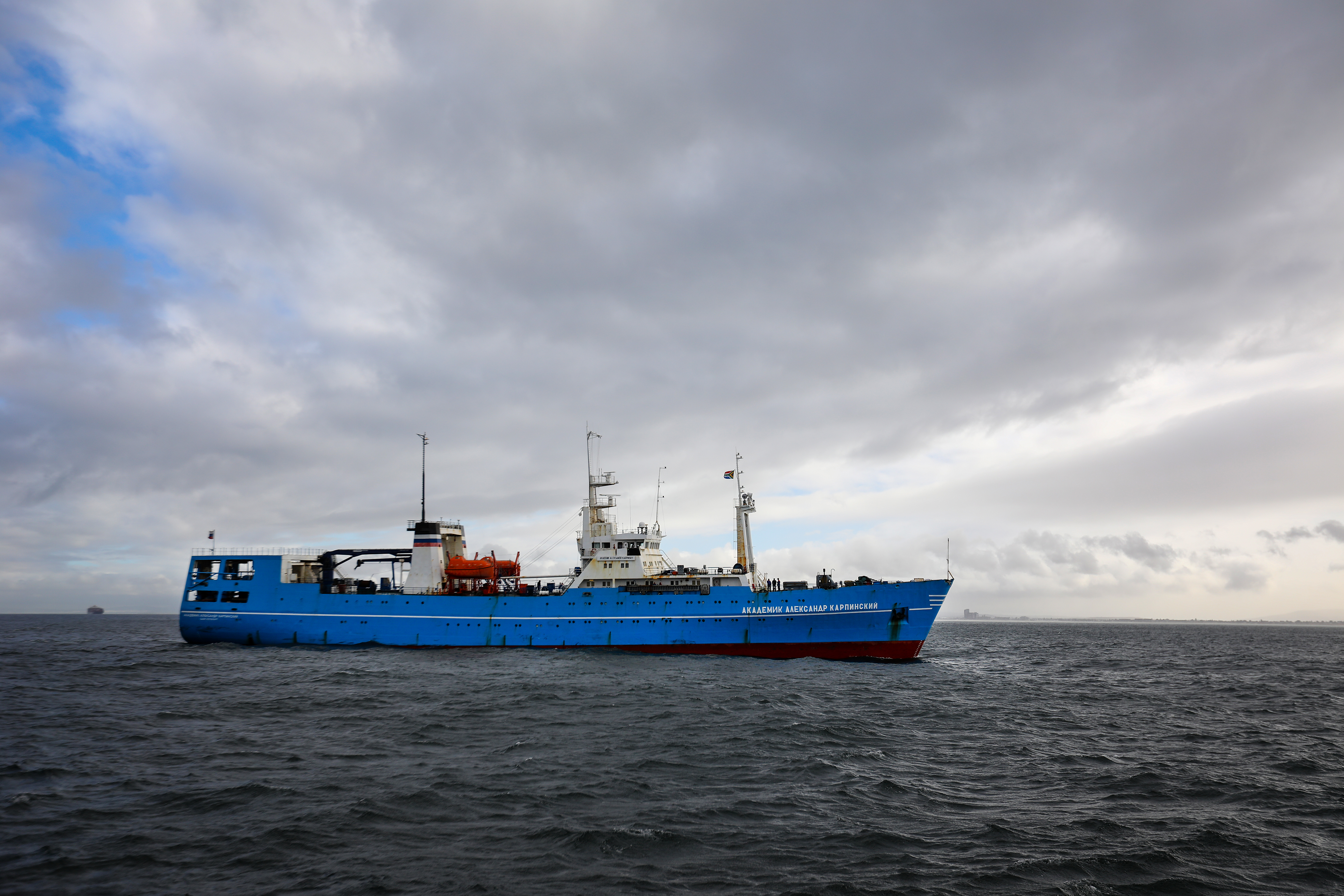
The Karpinsky on a moody ocean outside Cape Town in January, shortly before being towed into port by tugs. (Photo: Shelley Christians)
Though there are some, if debatable, attempts to soften noise in the Antarctic, at least 15 countries are known to have pulsed seismic blasts through the Southern Ocean in recent years — for purposes that range from monitoring volcanoes to gathering UN climate data.
Germany, according to German research, has led at 60,000km in surveys. Still, this is significantly less than Russia’s airgun lines, which could extend as far as 140,000km or more.
“There are questions around whether other — including Western — states might be laundering their ‘prospecting’ through ‘scientific research’,” according to Prof Alan Hemmings, an Antarctic governance expert at Canterbury University in New Zealand.
Hemmings cautions that prospecting may be laundered via indirect processes such as advanced modelling of data outside the Antarctic Treaty area.
But Russia, “as far as the accusations and evidence in the public domain are concerned, is seemingly in a class of its own”.
The New Zealand academic is hardly alone in his suspicions. In 2022, a paper commissioned by the Australian Navy flagged Russian activities through Cape Town, arguing that Rosgeo’s successive expeditions “could prepare the ground for potential hydrocarbon and mineral extraction, notably oil and gas deposits”. Last year, French academic commentary also flagged these operations.
The PMGE has also given the work of its Antarctic seismic ship special consideration.
In an October 2016 report, the subsidiary credits the ship for the “overwhelming majority” of work needed to identify Antarctica’s potential supergiant oil fields.
“Vast sedimentary basins were discovered with predicted hydrocarbon resources estimated at 70 billion tons of standard fuel,” this report notes.
“The overwhelming majority of these works were carried out from the R/V Akademik Alexander Karpinsky.”
Reaction by Russian, South African authorities
Rosgeo and its subsidiary have not denied their interests in Antarctic oil and gas, but they have repeatedly told Our Burning Planet that all of this is just legal science.
Read the explorer’s original reply, first published by Our Burning Planet in October 2021, below:
After repeatedly seeking comment from South African national environmental authorities since October 2021, we finally received a reply about 16 months later – on 1 February.
In that reply, Albi Modise, spokesperson for the Department of Environment, Forestry and Fisheries, says that — as a founding signatory of the 1959 Antarctic Treaty — South Africa “fully” subscribes to the founding principles under the Antarctic Treaty System and related environmental laws, including the mining ban.
That surely means that South Africa and other signatory states have a duty under Article 13 to the ATS’s environmental protection protocol, which also outlines the mining ban, to ensure compliance and that no one engages in any contrary activity.
Here, Modise does argue that signatory states protect Antarctica as a “collective”. But he also says Russia is free to pursue its national interests under the “freedom of scientific investigation” — a treaty cornerstone abused by Japan for years to justify its now withdrawn “scientific” whale slaughter.
Logistics and equipment are the responsibility of each signatory state, he says. Ports authorities should be contacted about vessel “presence”, and “any interested party” should submit questions to the ATS’s annual meetings.
South African officials, among the minority delegations not to join walkouts during Russia’s speech at the 2022 midyear meeting in Berlin, declined our comment requests, citing “media protocols”. The next meeting is only in May and June, hosted by Finland in Helsinki.
Since October 2021, we have also asked for comment from the ATS authorities to which Modise refers. The secretariat declined. We have also sent questions to various representatives of the ATS’s Committee for Environmental Protection on a number of occasions, to which answers have not been received.
Modise’s full reply, however, can be read below:
South Africa: special seat, exclusive club
For direct comment on the letter of demand, we have separately contacted Rosgeo; the South African Department of Environment, Forestry and Fisheries; the Department of International Relations and Cooperation; the Department of Transport; the Transnet National Ports Authority and the South African Maritime Safety Authority.
Replies to our queries were not received by deadline.
“It is shocking to think Russia’s Karpinsky has been using Cape Town as a launch pad for nearly 25 years to conduct oil and gas exploration in the ecologically vulnerable Antarctic region, which offers a sanctuary for critically endangered blue whales and emperor penguins, under the guise of scientific research,” according to Elaine Mills of Cape Town’s Greenpeace volunteer group.
Mills also says South Africa, as the only African country with a seat at Antarctica’s decision-making table, has a special watchdog role on behalf of the entire continent.
She adds: “We will continue with our vocal and very visible protests until the government meets our demands and fulfils its moral duty towards Africa, the continent most vulnerable to the devastating consequences of climate change.”
The Karpinsky is set to arrive at Antarctica’s Neko harbour on 28 February.
And whether or not Cape Town’s mayor wants that ship to be part of his grand new gateway vision, she is expected to return to the city before the austral autumn ice closes in. DM/OBP




















 Become an Insider
Become an Insider
I can’t believe that anyone that cares for the environment wants to see Antarctica becoming a tourist destination.
This visit, at this time, is ill advised.
The environmental impact of the CT mayor visiting Antarctica is in a different realm to hydrocarbon exploitation . The ( very astute ) Mayors transport would NOT have been sponsored – unlike the ruling party – by public payment of rates and taxes
Nauseating politicking comment – look after the environment or it is all over for everything !
Whilst it is admirable that the Mayor of CPT is an environmentalist and sees an opportunity for the creation of more tourists I am a bit concerned that not enough attention is being paid to our own backyard! The homeless situation in the City and on the Atlantic Seaboard – Cape Town’s most popular tourism centres, is alarming. Ratepayers have a right to enjoy the spaces they pay for and the homeless have a right to some sort of dignity. Address the homeless situation before saving the rest of the planet, please Mr Mayor, after all, charity ( and caring) begins at home…the rest will follow.
Hi Jane, we have to be careful with this line of thinking. Millions of people are poor or homeless or unemployed. By your logic, we should scrap investment in tourism and use that money and effort to house or feed or employ people. But if we did that, Cape Town’s tourism would suffer and numbers would decline. That means less revenue for Cape Town and its businesses to invest in maintenance and growth. Less people are employed and fewer contracts are signed. And so it declines.
Cape Town is an incredible destination. The mayor must promote it as a destination to build revenue for the government and businesses who in turn invest in building Cape Town, including addressing the homeless challenges faced by so many South Africans. The two go hand in hand.
Thanks for this response and I do agree with you…all I’m saying is let’s not put the cart before the horse…take care of serious issues at home ( no political representation in certain wards, homelessness in peak tourism areas, safety and security etc) and the rest will follow.
I agree with the opposition to Russia’s exploits with regard to the Antarctic, but I’m curious about where the Mayor’s outrage was when Russian vessel, Lady R, docked at Simon’s Town naval base recently and loaded/offloaded cargo in the dead of night surrounded by heavy security.
I doubt that the Mayor of the City of Cape Town has any authority over a military instillation within Cape Town.
The sactioned Russian owned LadyR docked in a Navel base in Simonstown and although there was concern expressed by the DA, but when our ruling gangsters allow ships to be loaded and off loaded in the middle of the night with no SARS, customs, police or military involvement, I agree, more noise could be made. The question remains what were the ANC selling, herion, cocaine, ammunitions, people trafficking, anything is possible.
I have absolutely no doubt that Russia actively targets regions that have a combination of rich natural resources and poor to no territorial governance with greedy, corrupt regimes. These are easy targets for exploitation and the governments concerned are co-conspirators in keeping it quiet and spinning lies as needed. Only brave investigative journalism can shine a bright light on these high crimes. Viva DM Viva!
Also mass tourism to Antarctic, even better any kind of tourism. Tourists have to be taken by air or by cruise ships and both are very bad for what is supposed to be an unpolluted piece of our planet. So Dear mayor, please stop promoting Cape Town as the world’s premier Antarctic gateway city. It might be good for Cape Town, but very bad for the Antarctic.
Cape Town is too far from the Continent to be a realistic tourism gateway to the Antarctic. The tourist flights are brutally expensive, and take people to a pretty barren and boring bit of the Continent. Cruise ships won’t operate from Cape Town to the Antarctic. It is just too far away.
What does intrigue me is that the Karpinsky is headed for Neko Harbour! Right in the middle of the Gerlache Strait, and not a place to be making loud bangs. Neko is full of whales at the moment, as is all of the Gerlache.
In case anyone wonders whether I know what I am talking about, I have been working in the Antarctic, as a scientist and guide, for the last forty five years. I am there now, and was in neko five days ago.
From the horses mouth….thank you.
I understand that we are getting conditioned to distrust Russia on just about everything they do – they have been disingenious about so many things that nobody can blame anyone doing it. But it is also still only scientific research; maybe we should take that into consideration. Also, if it is true that all countries in the world are doing similar research, then everyone should be dealt with in the same way. We should keep in mind that the disingenuity of Russia probably only come from the Putin government and that normal Russians, given the right information, will also support a cause of protecting the planet. They just are not allowed to do so at the moment.
A moral disgrace is when poverty is all around you and you do not see it, when men, women and children have to dodge bullets on an almost daily basis and it leaves you unmoved. When the gap between the ‘have and have nots’ grows in front of your eyes, but you are too busy looking for other business opportunities. Equally, there is no amount of evidence that is going to convince me that there is good and bad environmental degradation. The bad environmental degradation is what the Russians and Chinese do, the good environmental degradation is done by the others. Bolsheviks have stopped breeding under our beds and we need to move on and deal with new realities. The issue of our environment must be approached objectively and all transgressors exposed and held accountable equally.
Mr Mayor, I suggest you first address the effluent discharge of Cape Town into the ocean, before promoting ‘your’ city as a stop-over for tourists to Antarctica.
Absolute joke, criticising the russian’s exploration of the Southern Ocean while flying down to the Antarctic as a marketing stunt! Didn’t realise the mayor was that thick..